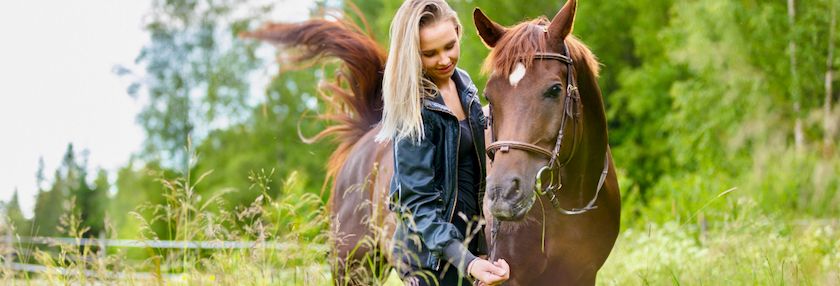Does All-Natural Mean It’s All-Good?


Vetting the latest supplement trends
Every year or two, you’ll seea new barrage of ads from equine supply catalogues (and sometimes from Facebook acquaintances) touting the latest miracle product for your horse. It seems like everything from persistent skin issues to joint discomfort to ulcers to attitude problems has a magical fix with a new supplement.
The one that seems to be making the rounds these days is CBD oil (cannabidiol), an extract from the cannabis plant. While humans have been using CBD oil for anxiety and chronic pain, there is very little research about the impacts of the substance in pets, and none at all in horses.
Horses have a different brain chemistry to ours and metabolize some drugs very differently from the way humans do.
Without research to tell us whether it works on horses and what the biochemical means of action is, we don’t really know what conditions, if any, could be improved by using it. We know even less about what a weight-appropriate dose would be to glean those benefits.
Very often, the new supplement or over-the-counter product is often touted to be “natural” and has innocuous or even health-focused active ingredients. What could it hurt to just throw some in the feed bin and see if it helps, right?
Question everything and the bandwagon, too
Experts say there are a few things you should consider before you jump on the next product company’s bandwagon:
Is there published research to support the item’s claims?
The gold standard for supporting research is a study published in a peer-reviewed academic journal. Peer-reviewed journals are notorious for scrutinizing an author’s study design, methods, and conclusions to make sure the study’s conclusions are well-founded and it’s sufficiently independent of financial interests.
A supplement company can conduct its own trials, but it’s hard to think of those as meeting the same standards of independence—they obviously want something that will show their product is effective.
Can you access that research?
Dr. Ronald Gill, associate department head and program leader for animal science extension at Texas A&M AgriLife Extension Service, encourages consumers to take a peek at that research. A company that has peer-reviewed research will have worked hard to get it, so if the research exists, you should expect them to help customers find it.
“You can always cherry pick supporting nuggets out of any data set,” said Gill. “Scientific design is critical to this process. Anyone can set up a ‘study’ to show what they want it to show.”
Does the company’s marketing rely exclusively on testimonials?
We’re all a little more likely to trust a product if a friend recommends it, but when it comes to nutritional and health decisions, a reputable maker will have more to hang their hat on.
Ask for help you know
Your veterinarian or nutritionist can look at a product’s labeling and claims and help you decide whether it’s something your horse would benefit from based on his medical condition and current diet.
Some supplements offer vitamins and minerals already offered in sufficient amounts by a balanced grain, and adding extra doesn’t necessarily result in the horse absorbing any more than normal. Your local cooperative extension agent is also trained to help you assess whether a product is appropriate to try or not.
Be careful when mixing products.
“Combining several supplements and/or feeding inappropriate amounts could lead to nutritional imbalances that can be very harmful to your animal,” said Dr. Jennifer Zoller, extension horse specialist at Texas A&M.
“If you do decide to feed a supplement, be sure to follow the amount indicated on the packaging. Those recommendations are usually based on the body weight of the animal, which can be difficult for some owners to estimate. We have a calculator on our app—Texas Horse Help—to help horse owners estimate body weight.”

You have to be comfortable
We all want the very best for our horses; that’s why there is a market for supplements and feed additives in the first place. It can be comforting to buy products touted to improve their health, but the most important consideration should always be whether those products really are a net gain for the horse.
Need more info? Read about the Texas Horse Help app here
About the author
Natalie Voss is a freelance writer and editor based in Lexington, Ky. Along with freelancing, Natalie is a features writer for the Paulick Report, a source of Thoroughbred horse racing news. When the isn’t writing, Natalie spends her time riding and training her mare, Jitterbug.
Tags:Horse Sense

Acreage Life is part of the Catalyst Communications Network publication family.
















